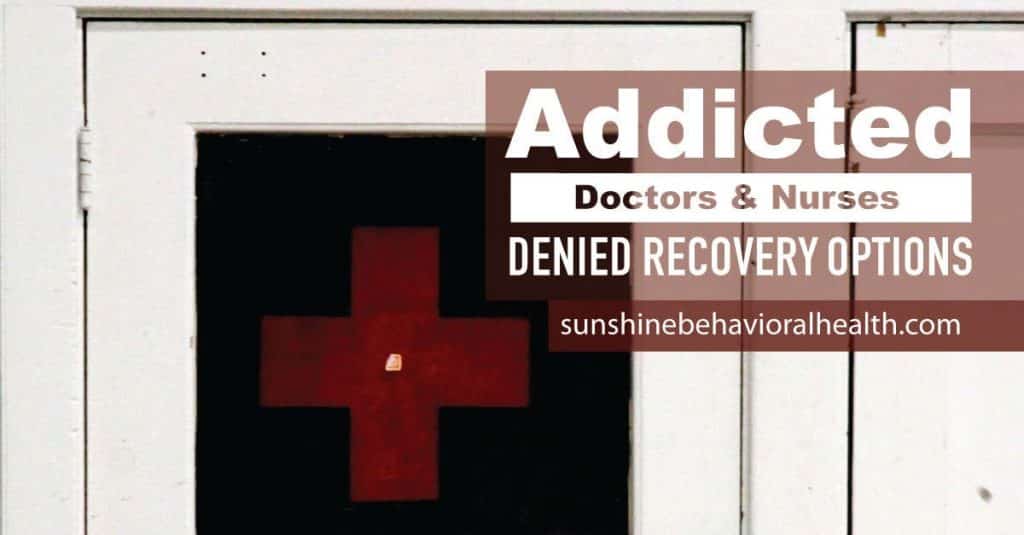
Addicted Doctors and Nurses Don’t Receive Much-Needed Drugs
You have a medical condition, so you seek assistance to treat it. Problem solved, right? Not necessarily. If you’re a doctor or a nurse with an addiction, you may not receive the help you want or need.Why Are Addictions Harmful?
Addicted doctors and nurses with addictions may- Steal their patients’ medications to use for themselves.
- Use prescription pads to obtain prescriptions illegally.
- Treat patients while high, drunk, or otherwise impaired
- Arrive at work late or take frequent absences from work.
What Kinds of Treatment Do People Receive?
Treatment is an important component of many PHPs. To keep their licenses, nurses and doctors may have to stay at inpatient rehab centers, participate in partial hospitalization programs, and/or attend intensive outpatient programs (IOPs) for specific periods of time. After treatment, they may have to participate in 12-step sobriety group meetings and submit to periodic drug or alcohol tests. While such treatments aim to help people personally and professionally, what they do not offer are just as notable as what they do. More specifically, many programs mandated by state PHPs and licensing boards do not include medication-assisted treatment (MAT).What Is MAT?
As the name indicates, medication-assisted treatment (MAT) uses medications to treat drug and alcohol addiction. MAT also incorporates behavioral therapies and counseling as part of the treatment process. Common medications used in MAT include- Methadone
- Buprenorphine
- Naltrexone
- Suboxone (a combination of buprenorphine and naloxone)
Do PHPs Use MAT?
Despite its many benefits, MAT is not always part of addiction treatments. Some state PHPs and similar programs are reluctant to allow people to use MAT protocols as part of their care. Registered nurse Bill Kinkle developed an addiction to opioids and sought assistance from the peer nurse assistance program in his home state of Pennsylvania. Kinkle asked the state program if he could use Suboxone, a medication that consists of buprenorphine or naloxone, to treat his addiction. The state program said he could use the medication only if he developed a detailed plan for tapering off the medication. Kinkle instead opted for a combination of inpatient/outpatient treatments. Similarly, Dr. Peter Grinspoon was addicted to the opioid drug Vicodin and authorities caught him writing fake prescriptions to obtain the drug. He asked a PHP for assistance. The PHP sent him for inpatient treatment, but this treatment did not include MAT or MAT-related counseling, a decision that Grinspoon questioned. “Why on earth would you deny physicians,” asked Grinspoon, “the one livesaving treatment for this deadly disease that’s killing more people in this country every year than died in the entire Vietnam War?” Grinspoon told National Public Radio that he had multiple “awful” experiences relating to rehab: “I recovered despite going to rehab, not because I went to rehab.”Why Is MAT Controversial?
Medical and treatment professionals, state licensing administrators, the general public, and others are sometimes reluctant to endorse MAT. Critics of the treatment say that it- Trades one addiction for another (substitutes an addiction for opioid drugs for an addiction to drugs such as methadone, Suboxone, or other drugs).
- Impairs the mental abilities of people who treat others in life-and-death situations and could produce deadly results.
- Is not any more effective than other forms of treatment that have been studied.
Is MAT Effective?
Other studies have found that MAT does not cause addiction, but treats it. They have found that MAT may be more effective than other types of treatment. The National Institutes of Health reported that “[o]pioid-addicted youth who continued to take Suboxone for 12 weeks were less likely to use opioids, cocaine, and marijuana, to inject drugs, or drop out of treatment than those who received short-term detoxification and counseling.” “Research shows that a combination of medication and therapy can successfully treat” substance abuse, said the U.S. Substance Abuse and Mental Health Services Administration, who added that “for some people struggling with addiction, MAT can help sustain recovery.” MAT helps people become sober and increases the chances that they will stay that way. Making MAT medications more available may help medical professionals treat their addictions. When they become healthy, they may help others restore their own health. Using MAT may create win-win situations for individuals and their communities. Sources: “Buprenorphine.” Substance Abuse and Mental Health Services Administration. https://www.samhsa.gov/medication-assisted-treatment/treatment/buprenorphine. May 7, 2019. “Effective Treatments for Opioid Addiction.” National Institute on Drug Abuse. https://www.drugabuse.gov/publications/effective-treatments-opioid-addiction/effective-treatments-opioid-addiction. November, 2016. “Extended Suboxone Treatment Substantially Improves Outcomes for Opioid-Addicted Young Adults.” National Institutes of Health. https://www.nih.gov/news-events/news-releases/extended-suboxone-treatment-substantially-improves-outcomes-opioid-addicted-young-adults. November 4, 2008. Harper, Jake. “Black Market for Suboxone Gives Some a Glimpse of Recovery.” Kaiser Health News. https://khn.org/news/black-market-for-suboxone-gives-some-a-glimpse-of-recovery/. October 9, 2018. “Information About Medication-Assisted Treatment (MAT).” Food and Drug Administration. https://www.fda.gov/drugs/information-drug-class/information-about-medication-assisted-treatment-mat. February 14, 2019. “Medication and Counseling Treatment.” Substance Abuse and Mental Health Services Administration. https://www.samhsa.gov/medication-assisted-treatment/treatment. May 7, 2019. Selzer, Jeffrey and Sharon Stancliff. “Buprenorphine Maintenance Therapy in Opioid-Addicted Health Care Professionals Returning to Clinical Practice: A Hidden Controversy.” Mayo Clinic Proceedings. https://www.ncbi.nlm.nih.gov/pmc/articles/PMC3498220/. August, 2012. Simmons-Duffin, Selena. “For Health Workers Struggling with Addiction, Why Are Treatment Options Limited?” Health Shots. National Public Radio. https://www.npr.org/sections/health-shots/2019/09/06/757990241/for-health-workers-struggling-with-addiction-why-are-treatment-options-limited. September 6, 2019. Yasinski, Emma. “Doctors and Nurses with Addictions Often Denied a Crucial Recovery Option.” Kaiser Health News. https://khn.org/news/doctors-and-nurses-with-addictions-often-denied-a-crucial-recovery-option/. September 19, 2019.A Message From Our CEO
Medical disclaimer:
Sunshine Behavioral Health strives to help people who are facing substance abuse, addiction, mental health disorders, or a combination of these conditions. It does this by providing compassionate care and evidence-based content that addresses health, treatment, and recovery.
Licensed medical professionals review material we publish on our site. The material is not a substitute for qualified medical diagnoses, treatment, or advice. It should not be used to replace the suggestions of your personal physician or other health care professionals.




